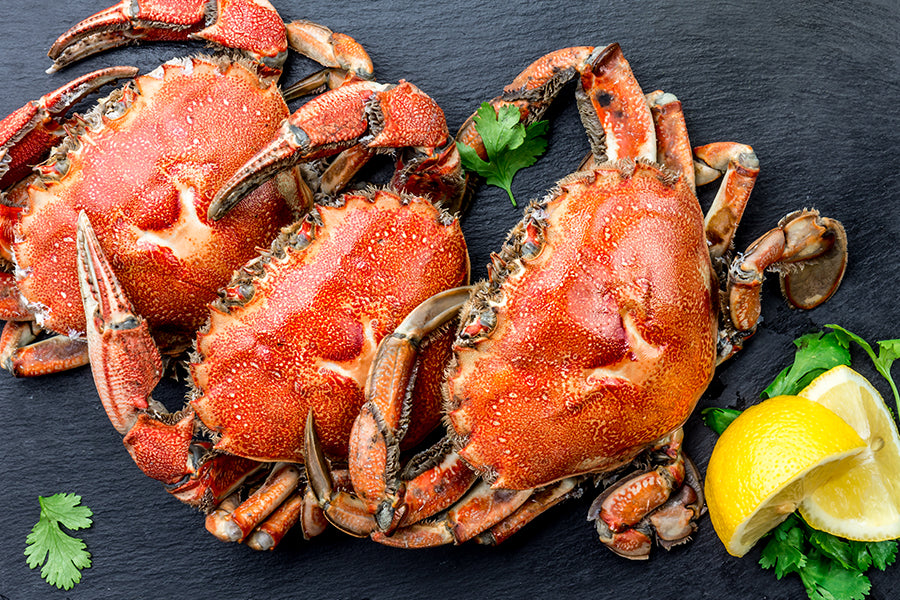Crab, a staple food in some regions and a delicacy in others, is among some of the most popular seafood in the world. Its sweet and salty flavor makes it appealing for those looking for delicious and nutritious food options to add to their diet.
Crabs are believed to be among the oldest human food consumed by a large part of the population, especially those living by the coast. Archaeologists worldwide have found evidence that people in different regions had crabs as a regular meal option.
Modern humans also love crabs as much as our ancestors did. The marine species are available in different varieties. The list includes Blue Crab, Snow Crab, Dungeness Crab, King Crab, and more. All of these crab varieties are full of nutrients and taste. They contain proteins, good fat, minerals, vitamins, and many other beneficial elements.
Sounds interesting? Read on to find all about crab's nutrition facts, benefits, and tips for incorporating it into your meals.
Nutrition Facts of Crabs: What Does It Add to Your Diet?
Most of the essentials in crabs are also commonly available in other types of seafood. However, it has lower levels of mercury in comparison to tuna, marlin, swordfish, and a few other popular seafood items. Some of the distinctive elements that you can have by taking a portion of crabs in your diet include:
Vitamin B12
There is 11.5 mcg of vitamin B12 in 100 grams of crab. It helps maintain energy levels and aids in the production of red blood cells. The vitamin is found in both crabmeat and its organs, making it easy to get your daily intake from this tasty source.
Iron
You can have a good 43 milligrams of iron with 100 grams of crab consumption, which is way higher than what your body requires daily. The iron-rich food helps your body produce more red blood cells and hemoglobin, which carry oxygen through different organs.
Zinc
If you want to add zinc into your diet naturally, the crab can be a great choice as it has 4 milligrams of zinc in each 100 grams intake. This is the same amount of zinc in 100 grams of beef. Zinc helps with wound healing, boosts immune system health, helps with protein synthesis, and supports cell reproduction.
Selenium
Another great resource you get from crabs is Selenium, an antioxidant that fights off free radicals in your body and protects against chronic diseases. It also helps to regulate thyroid hormones. A 100 grams crab intake offers you 40 mcg of Selenium. This food is one of the richest sources of selenium for humans.
Copper
Copper assists with connective tissue formation, iron absorption, and energy production. If you take 100 grams of crab, you may receive 663 mcg of copper. This is a sufficient amount for your body if needed.
Magnesium
A single serving of 100 grams of crab meat has 63 mg of magnesium, another vital mineral worth mentioning. This essential mineral helps the body to produce proteins, regulate blood pressure, maintain healthy bones and muscles, and create energy.
It also helps control nerve impulses and muscle contractions. In addition, this important element can help reduce inflammation in the body and aid in digestion.
Phosphorus
Crab is also a good source of phosphorus, a mineral necessary for bone health. One serving of 100 gm crab meat has around 46 mg to 56 mg of phosphorus. This mineral is also essential for helping to make and store energy in the body.
Calcium
Consuming 100 grams of crab gives you 59 gm of calcium that aids healthy and strong bones. Calcium also ensures proper nerve and muscle function and the formation of new bone tissues.
Protein
Crab meat is also an excellent source of protein, providing a quality combination of essential amino acids that are important for building muscles and repairing tissues.
A 100 grams of cooked crab provides you with 18 grams of protein.
Folate
Folacin or Folate is a common name for naturally occurring folic acid, the scientifically formulated version of food folate. The supplement is also referred to as vitamin B9, which helps with metabolism and cell growth.
Niacin
Niacin, also known as vitamin B-3, is found in crab meat. The quantity available in 100 grams of crab meat is 1.3 mcg. This vitamin is essential in energy production, metabolism, and maintaining healthy skin, hair, eyes, and liver. It can help reduce cholesterol and triglyceride levels. It also keeps the nervous system and digestive tract healthy.
Related Article: Why You Should Take Multi-Vitamins Daily?
Potential Health Benefits of Having Crabs in Your Diet Regularly
Having crabs in your diet regularly can provide several health benefits that help you maintain a healthier lifestyle overall. The potential benefits are undeniable, from improved cardiovascular health to better immunity and higher energy levels. So, consider adding some crab to your regular meal plan today and start reaping the benefits.
Improved Cardiovascular Health
One of the most important potential health benefits of having crabs in your diet regularly is improved heart health. Crabs are a great source of omega-3 fatty acids, which are essential fatty acids linked to reducing inflammation and improving overall cardiovascular health.
Not only do these healthy fats help reduce cholesterol levels, but they can also help lower blood pressure and reduce the risk of stroke, heart attack, and other heart-related conditions.
Healthier Immune System
In addition to improved cardiovascular health, crabs also contain high amounts of Vitamin B12 and selenium. These two minerals are essential for a healthy immune system, as they help protect against illness and disease.
Improved Thyroid Function
Selenium in crabs is vital for thyroid function, helping to regulate hormones and improve metabolism.
Source of Energy
Vitamin B12 in crabs helps keep energy levels high and can contribute to combating fatigue and low moods. Vitamin B12 and folate in crabs also prevent anemia as they provide the needed vitamins.
Helps Maintain Healthy Body Weight
Finally, crabs are a great source of lean protein, essential for building muscle and maintaining a healthy weight. Protein also helps keep you full longer, making it easier to resist unhealthy snacks and cravings.
How to Incorporate Crabs in Your Daily Meals
Crab makes a delicious and nutritious addition to any meal. Here are some tips for incorporating crab into your meals:
- Use fresh or frozen crab meat topping for salads, tacos, sandwiches, soups, and more.
- Make crab cakes with alternate ingredients such as fish, vegetables, and herbs.
- Try making a classic crab bisque with butter, onion, celery, garlic, and tomato paste.
- Make a stir-fry with fresh or canned crab meat, vegetables, and spices for an easy weeknight meal.
- Stuff your favorite vegetables, like bell peppers or tomatoes, with a crab and cream cheese mixture for a fantastic appetizer.
- Create a delicious Crab Alfredo pasta dish with butter, garlic, heavy cream, parmesan cheese, and cooked crabmeat.
- Make your seafood gumbo with fresh or canned crab meat, onions, celery, peppers, and other flavors.
- For a comforting meal, try a seafood pot pie with cooked crabmeat, potatoes, carrots, onions, butter, cream, and seasoning.
- Spice up your favorite noodle or rice dish with cooked crab meat and vegetables such as mushrooms or zucchini.
- Create a nutritious crab salad with cooked crab meat, celery, onion, and mayonnaise.
By incorporating these tips into your weekly meal-planning routine, you’ll be able to enjoy the deliciousness of crab in all its forms!
Related Article: How to Make Perfect Grilled Salmon in 15 Minutes
Conclusion
In conclusion, there are many health benefits associated with eating crab, including improved cardiovascular and immune system health, weight loss support, and protection against nerve damage. In addition, it is a good source of protein, low in fat, and rich in essential vitamins and minerals. Eating crab regularly can help you to enjoy all the benefits that this delicious food has to offer.
FAQs
1. Is crab healthier than fish?
When it comes to comparing the health benefits of crab and fish, both offer certain advantages. Both are low in fat and cholesterol and contain high levels of protein. Fish is generally higher in omega-3 fatty acids than crab, which helps reduce inflammation.
Crab has slightly more vitamin B12 than most fish, although some species vary. Crab is also rich in minerals like selenium and zinc, which are essential for healthy skin and metabolism.
Ultimately, the question of which is healthier – crab or fish – depends on your dietary needs. Fish may be a better choice if you're looking to increase your intake of omega-3 fatty acids; however, if you want to boost your vitamin B12 levels, the crab may be the better option.
Ultimately, both are excellent sources of lean protein and vital nutrients, so it's a matter of personal preference.
2. Is crab a superfood? How much nutrition is in crab?
Crab is a highly nutritious food. It's high in protein, low in fat, and contains several essential vitamins and minerals. A 3-ounce serving of crab meat provides about 17 grams of protein, 1 gram of total fat, and almost no carbohydrates.
It also has the minerals calcium, phosphorus, and selenium, as well as vitamins B-12, niacin, and iron. Crab can also provide omega-3 fatty acids, essential for heart health and brain development.
The amount of nutrition in crab varies depending on the type of preparation. For example, eating a plain boiled or steamed blue crab will be much lower in fat than having it fried or dipped in butter sauce.
3. Is crab better than lobster?
Overall, both crab and lobster are healthy choices that offer a variety of nutritional benefits. However, for those looking for the healthiest option, the crab has generally been considered the better choice due to its lower calorie, fat, and cholesterol content. Ultimately, it’s up to you to decide which seafood option fits your dietary needs and preferences.
Reading List
Article Sources
- Gorini, Francesca, et al. “Selenium: An Element of Life Essential for Thyroid Function.” Molecules, vol. 26, no. 23, Nov. 2021, p. 7084. PubMed Central, https://doi.org/10.3390/molecules26237084.











